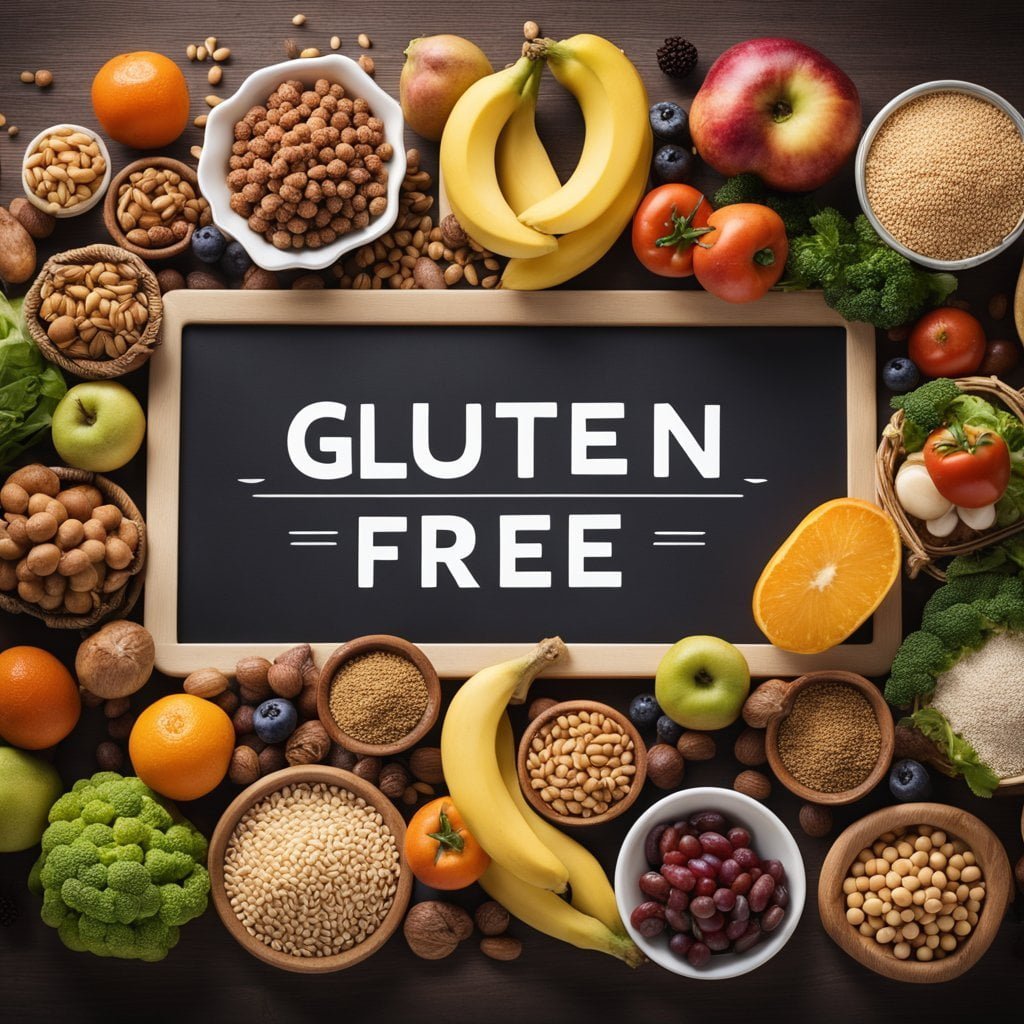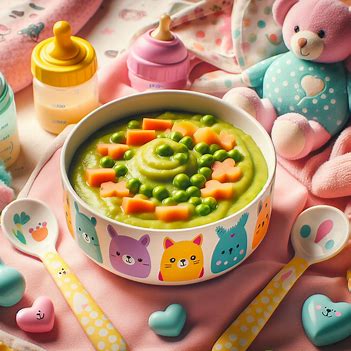
Introduction to gluten-free food for babies
As a parent, you want nothing but the best for your little one, especially when it comes to their health and nutrition. The idea of introducing solid foods to your baby can be both exciting and overwhelming. If you are considering a gluten-free diet for your baby in the UK, this article is here to guide you. In this comprehensive guide, you will learn about gluten and its effects on babies, the benefits of a gluten-free diet, easy recipes, nutritional considerations, shopping tips, and gluten-free brands available in the UK.
Understanding gluten and its effects on babies
Gluten is a type of protein found in grains such as wheat, barley, and rye. For some individuals, consuming gluten can lead to digestive issues and other health problems. Babies, especially those with a family history of gluten intolerance or celiac disease, may be at risk of adverse reactions to gluten. Symptoms can range from mild discomfort to more severe issues like malabsorption and failure to thrive. It’s important to understand how gluten can affect your baby’s health and well-being.
The benefits of a gluten-free diet for babies
A gluten-free diet can offer several benefits for babies, especially those with gluten intolerance or celiac disease. By eliminating gluten from their diet, you can help alleviate digestive issues and promote better overall health. A gluten-free diet may also improve nutrient absorption and support healthy growth and development. Additionally, a gluten-free diet can help prevent the long-term complications associated with celiac disease, such as nutrient deficiencies, stunted growth, and autoimmune disorders.
Common misconceptions about gluten-free diets for babies
There are several misconceptions surrounding gluten-free diets for babies. One common myth is that a gluten-free diet is unnecessary unless your baby has been diagnosed with celiac disease. However, even babies without a diagnosed gluten intolerance can benefit from a gluten-free diet, as it may reduce the risk of developing gluten-related issues in the future. Another misconception is that a gluten-free diet is challenging to follow. With the right information and resources, providing gluten-free meals for your baby can be simple and enjoyable.
Easy gluten-free recipes for babies in the UK
Preparing gluten-free meals for your baby doesn’t have to be complicated. Here are a few easy and nutritious recipes to try:
Sweet Potato and Apple Puree: Steam sweet potatoes and apples until tender, then blend until smooth. This delicious puree is packed with vitamins and minerals.
Quinoa and Vegetable Medley: Cook quinoa according to package instructions and mix it with steamed vegetables like carrots, peas, and broccoli. This colourful and nutrient-dense dish is sure to please your little one.
Banana Oat Pancakes: Mash ripe bananas and mix them with gluten-free oats, eggs, and a pinch of cinnamon. Cook the mixture as you would regular pancakes. These fluffy and nutritious pancakes make a great breakfast or snack option.
Nutritional considerations for gluten-free baby food
When following a gluten-free diet for your baby, it’s important to ensure they receive all the necessary nutrients for healthy growth and development. Some gluten-free grains and flours, such as quinoa, amaranth, and brown rice, can be excellent alternatives. Including a variety of fruits and vegetables in your baby’s diet is also crucial to provide essential vitamins and minerals. Consult with a healthcare professional or a registered dietitian to ensure your baby’s nutritional needs are met.
Introducing gluten-free foods to your baby’s diet
Introducing gluten-free foods to your baby’s diet should be done gradually. Start by introducing single-ingredient purees and gradually incorporate more complex meals. This approach allows you to monitor any potential reactions or sensitivities your baby may have. It’s always a good idea to consult with your paediatrician before making any significant changes to your baby’s diet.
Tips for shopping for gluten-free baby food in the UK
Finding gluten-free baby food options in the UK can be easier than you think. Look for products labelled as gluten-free, or check the ingredients list for any potential sources of gluten. Shopping at health food stores or speciality shops can also provide a wider range of gluten-free options. It’s important to read labels carefully and familiarize yourself with gluten-free certifications and symbols.
Gluten-free brands and products for babies in the UK
The UK offers a variety of gluten-free brands and products specifically designed for babies. Some popular brands include Ella’s Kitchen, Organix, and HiPP Organic. These brands offer a range of gluten-free baby food options, from purees to snacks and finger foods. It’s always a good idea to explore different brands and products to find what works best for your baby’s tastes and dietary needs.
Ella’s Kitchen Organic Fruit Smoothie Assortment

Red, Purple, Green, Yellow and Pink – 25 Pouches
100 Percent Organic Smoothie Fruits from the Leaders in Baby Food. No artificial colours flavours or preservatives or added sugar just 100 Percent fruit. The Red One Smoothie fruit contains Strawberries Raspberries Apples and Bananas. The Purple One Smoothie fruit contains Blackcurrants blueberries Apples and Bananas. The Green One Smoothie fruit contains Apples Pears Bananas and Kiwi fruit.
Keep me in a cupboard. Once opened, it can be kept in the fridge for up to 48 hours. I can be frozen, I will be a bit cold but still taste great!
Pros:
- Health benefits: Gluten-free food can be beneficial for children who have gluten intolerance or celiac disease. It helps to alleviate their symptoms and promote overall well-being.
- Increased awareness: The popularity of gluten-free diets has led to increased awareness about food allergies and intolerances. This can help parents and schools better understand and accommodate the dietary needs of children.
- Diverse food options: The availability of gluten-free products has expanded over the years, providing more diverse food options for kids with gluten intolerance. This allows them to enjoy a wide range of delicious and nutritious meals.
Cons:
- Limited nutritional variety: Gluten-free diets can limit the variety of nutrients children may receive, as many gluten-containing foods are rich sources of essential nutrients like B vitamins and fibre.
- Higher cost: Gluten-free products typically have a higher price tag compared to their gluten-containing counterparts. This can put a strain on families with tight budgets and make it more difficult to afford a gluten-free diet for their children.
- Social challenges: Following a gluten-free diet can sometimes be socially challenging for children, as it may require them to avoid certain foods during parties or school events. This can lead to feelings of exclusion or frustration.
Conclusion: Embracing a gluten-free lifestyle for your baby
Embracing a gluten-free lifestyle for your baby can be a positive step towards their overall health and well-being. By understanding gluten and its effects on babies, you can make informed decisions about their diet. With easy recipes, nutritional considerations, and tips for shopping, providing gluten-free food for your baby in the UK is both achievable and enjoyable. Remember to consult with healthcare professionals for personalized advice and recommendations. Start nourishing your baby with gluten-free goodness today!
CTA: Consult with your paediatrician or a registered dietitian to learn more about gluten-free diets for babies and to create a personalized plan for your little one’s nutritional needs.





2 responses to “Nourishing Nurture: Gluten-Free Food for Babies in the UK – Easy Recipes and Ideas”
[…] diving into the world of gluten-free recipes, it is important to understand what gluten is and how it can impact our bodies. Gluten is a protein […]
[…] often lack. Secondly, kids are known for their picky eating habits, where the sight or taste of vegetables can instantly trigger a negative response. Lastly, the constant exposure to junk food […]